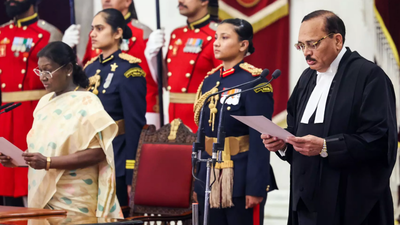
Justice Surya Kant takes oath as CJI
NEW DELHI: Chief Justice of India Surya Kant said on Monday that right to freedom of speech and expression “is doubtless one of our most valued rights” requiring further strengthening but emphasised the need for a framework that “ensures responsibility, accuracy and respect in public discourses”. Speaking to TOI after taking oath as the 53rd CJI, the first from Haryana, Justice Kant said, “It is not freedom of speech that causes harm to the dignity or reputation, it is the misuse of that freedom and the inefficiency of our remedies that causes it.”Importantly, his predecessor, ex-CJI B R Gavai also shared the view. “Right to free speech is always subject to reasonable restrictions specified in the Constitution. If a person’s speech is in violation of those reasonable restrictions, it falls foul of the fundamental right,” Gavai said.Asked whether the existing mechanism provides for adequate remedies against abusive or hate speeches, the outgoing CJI said, “I feel there should be a regulatory mechanism that needs to be put in place regarding this. It is for Parliament to take a decision on this issue.”CJI Kant said the right to free speech comes with an equally important obligation – exercise in a manner that aligns with a citizen’s fundamental duties. “The Constitution envisions not just a free society, but a respectful and harmonious one. When we forget that duties are intrinsic to rights, we distort the balance that keeps democracy functional and we risk making the Constitution unworkable,” he said.To a question whether distortions in social media through selective reporting is a deterrence for judges from posing probing questions or criticising actions of litigants, CJI Kant said such incidents, which have proliferated in the past few years, “makes us more cautious in expression, but it must not deter us from asking probing questions necessary for delivering justice”. On Saturday, he had told the media that he does not get pressured by social media.Asked whether the rich, influential and powerful, represented by renowned senior advocates, get more time from Supreme Court compared to common litigants, the CJI said, “The guiding principle of all courts in the country, including SC, is that the justice system must be equal for all regardless of status, profession, or representation.””Cases are taken up based on objective criteria such as urgency, nature of rights involved and the stage of proceedings. Individual stature or resources cannot, do not, and shall never determine priority or even time allotted to such cases,” he said.
- Tags
- India



